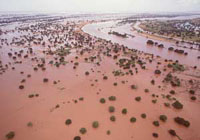Climate hampers development efforts in poorest countries
Droughts, floods and rising sea levels sparked by climate change are threatening development efforts in the world's poorest countries, experts and aid workers said Monday at an international water forum. Regions including Africa and South Asia home to most of the 1.1 billion people who live without clean water could be hit hard by changing weather patterns, experts at the 4th World Water Forum said.

"Droughts will worsen," said Michel Jarraud, secretary-general of the World Meteorological Organization. "We will see deforestation, forest fires, a loss of biodiversity and degradation of the environment."
Gana Unnayan Sangstha, an aid worker who helps install community water systems in Bangladesh's poor coastal province of Satkhira, has already seen the effects of global warming firsthand. "Bangladesh is the lowest-lying country in the world. There are salinity intrusions into larger areas due to climate change, and a rise in sea-water levels," Unnayan Sangstha said.
When salt gets into ground water like in the wells used in many Bangladesh projects it becomes useless for drinking or irrigation. Increasing salinity is also occurring in areas around Karachi, Pakistan, where Tanveer Arif works on a rural-aid project aimed at building ponds that collect water in an arid environment.
He doesn't blame the increased salinity on global warming, but has noted less rain for his ponds to capture. "Since about two decades ago, there is some climate change, and the rains are moving to the east," Arif said.
The world's rivers may also be affected by global warming, said Jamie Pittock, executive director of the World Wildlife Fund. "Rivers like the Indus and Ganges could see reduced flow," he said. "At the moment, they have a steady base flow from melting glaciers, but when those glacier flows are reduced, the rivers will become more flashy, with greater flows in the wet season and lower flows in the dry season."
"That will be devastating, not only for people, but for the environment," he added. Moreover, developing countries may pay the brunt of the costs of a problem caused in part by industrialized countries whose vehicles and factories contribute to greenhouse gases.
So far, poor nations haven't asked for much at the summit here. But their demands could escalate. Chad's water minister, Hauoa Outman Djame, called for "global risk management" and said his country wants "an effective system for prior (disaster) alert," something it probably can't do alone.
Pittock of the WWF said developing nations should speak up more and ask for help. "If I were the government of India or Pakistan, I would be saying climate change is a real risk to our nation, and be asking for major technical support and funding to adapt to the risk," he said, reports the AP.
N.U.
Subscribe to Pravda.Ru Telegram channel, Facebook, RSS!





